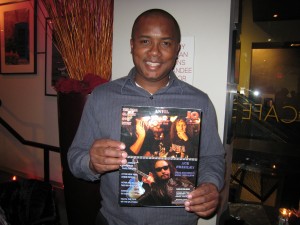
JET Filmmaker/JQ subscriber Aaron Woolfolk at the New York premiere of his film ‘The Harimaya Bridge,’ December 2009
By Lyle Sylvander (Yokohama-shi, 2001-02) for JQ Magazine
Most JETs enjoy telling tales about the cities they lived in. But it’s a select few who take the extra step of making movies that actually take place in them. JETAA Southern California’s Aaron Woolfolk (Kochi-ken, 1992-93) is the writer and director of The Harimaya Bridge, which received a theatrical release in Japan last year and premiered in New York’s Upper West Side in December as part of the African Disapora Film Festival.
The film stars Ben Guillory as Daniel, an American man who travels from San Francisco to Kochi after his estranged son—who works as an assistant English teacher—Mickey (Victor Grant) dies in a traffic accident. There, Daniel’s own prejudices spark rows with his Japanese hosts and daughter-in-law Noriko (Saki Takaoka) as he discovers secrets his son left behind. The film will receive a wider release in the U.S. for spring 2010, and JQ talked with Aaron about the making of the film.
How did you get involved with JET?
During my senior year in college, I ran into a couple of friends who were on their way to pick up an application for the JET Program. I had nothing to do when I saw them, so I tagged along. I had never heard of the program before, but it definitely intrigued me. I had always wanted to experience another culture firsthand, and thought the best way to do that would be to live in that culture, rather than merely visiting it for a limited time.
How did you decide to be a filmmaker?
I was always a storyteller, even at a young age. I also had a practical side to me and when it came time to decide on a career, I briefly considered law school, but the storyteller side of me won out and I applied to film school. I got in to Columbia’s MFA program, and I’ve never looked back. I found the decision to be very liberating and know that I’m much happier now than if I had gone to law school.
Are there any Japanese filmmakers who have influenced your work?
Yes, definitely. As a teenager I discovered many foreign directors I admired, including Japanese directors—particularly Ozu, Mizoguchi, Itami and Kurosawa—and they’ve all had an impact on my work in positive ways. In particular, The Harimaya Bridge is a kind of homage to Kurosawa’s Ikiru, which is my favorite fi lm of all time.
Can you talk about the genesis of The Harimaya Bridge and how the film came together?
I first started writing The Harimaya Bridge in film school but knew that it would be difficult for a first-time filmmaker like me to convince people I could make a feature film in Japan. So I made two short films in Japan—a comedy called Eki and a drama called Kuroi Hitsuji. These shorts had successful showings at film festivals and I won a few directing awards, which made the idea of me making a feature film in Japan more viable.
Then I won a development grant funded by Disney and offered through Danny Glover’s theater company in L.A. Danny’s star power lent support for the film but it was ultimately producer Ko Mori who helped pull all the necessary elements together. He’s one of the smartest people I’ve ever met and his passion and integrity really kept the whole thing together during the fi nancing process. In the end, there were three major backers—Eleven Arts, Ko’s company, based in the U.S.; Toei, a Japanese distributor; and SSD, a Korean company.
The film received a theatrical release in Japan last summer. How was it received?
The film’s reception has been uniformly positive. Audiences love the characters and story, and really appreciate the fact that it was made by someone who actually lived in Japan. I purposely wanted to avoid many of the clichés found in American films about foreign places, particularly the arrogance and sense of superiority with which they denigrate foreign cultures. So, the Japanese audiences I talked to were impressed by my portrayal of Japan’s culture and people. In fact, some audience members were surprised that it was directed by a non-Japanese person. Also, a lot of JETs and JET alums in Japan were really enthusiastic in their response to the fi lm, which really made me happy.
What are your future plans?
I’m currently working on a comedy-drama that takes place in the American South called Summer SOULstice, and also a drama called Dream I Have, which is inspired by a true story about a Japanese man who dreams of opening a jazz club in New Orleans. In terms of my hopes for a career, ideally I’d like to go back and forth between making intimate dramas and big Hollywood movies. Ang Lee and Christopher Nolan both have the type of career I’d like to emulate.
For more info and future screenings, visit www.theharimayabridge.com and www.facebook.com/pages/The-Harimaya-Bridge/222376906581?ref=ts.


one comment so far...
[…] 2010 January/February – Aaron Woolfolk interview (JET alum, first African American to direct a feature film in Japan) by Lyle Sylvander […]